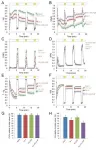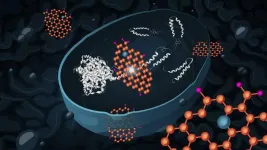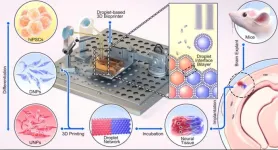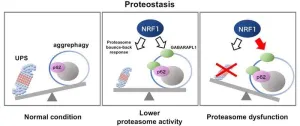(Press-News.org) A team led by researchers from Mass General Brigham reports promising results for a monoclonal antibody that takes aim at a new target for Alzheimer’s disease. Inspired by their previous identification of a genetic variant in the APOE gene that provides extreme resistance against Alzheimer’s disease, the team, which includes investigators from Mass Eye and Ear and Massachusetts General Hospital, developed a therapy that mimics the behavior of this genetic variant in a preclinical model, reducing abnormal tau proteins associated with Alzheimer’s disease and offering a path to treatment that does not target amyloid beta plaque buildups. The study published October 4th in Alzheimer's and Dementia: The Journal of the Alzheimer’s Association.
This work builds on previous research led by this team that identified a genetic variant called APOE Christchurch that led to Alzheimer’s resistance and protection against cognitive decline for almost three decades in a woman in her 70s who was part of a family in Colombia at an unusually high genetic risk to develop early-onset disease. To turn those findings into a potential treatment, the researchers have now developed antibodies that could target interactions between ApoE and proteins called heparan sulfate proteoglycans, effectively mimicking the protective mechanism and effects of the Christchurch genetic variant. They used the crystal structure of the antibodies and computer modeling to predict how it would bind to the target of interest. They found that one antibody, called 7C11, could inhibit the pathological interaction, conferring resistance to Alzheimer’s. They validated the specificity of the antibody and determined the most effective doses to deliver. Their therapy, tested in mice, resulted in a reduction of abnormal tau proteins found in their brains and retinas.
Study limitations include a short treatment duration applied to an early disease state. Future studies in additional animal models are necessary to confirm preclinical efficacy.
“Our 7C11 antibody was able to target interactions responsible for a major genetic risk factor for sporadic Alzheimer’s,” said co-corresponding author Joseph F. Arboleda-Velasquez, MD, PhD, an associate scientist in the Department of Ophthalmology at Mass Eye and Ear. “Our findings point to an alternative and hopefully more effective approach to existing treatments and those in clinical trials that focus on reducing amyloid plaques, and ultimately may lead to disease-modifying therapies for various other neurodegenerative conditions.”
“Remarkably, the subject with extreme protection against Alzheimer’s disease who carried the APOE Christchurch variant had a similar clinical presentation with much lower tau accumulation despite severe amyloid pathology,” said Claudia Marino, a research fellow that co-led the study with Arboleda-Velasquez. “In sum, the 7C11 antibody was able to reproduce in an in vivo model the protective effect of the APOE Christchurch variant.”
END
Antibody therapy inspired by patient case reduced tau tangles in a preclinical model of Alzheimer’s disease
2023-10-04
ELSE PRESS RELEASES FROM THIS DATE:
Demystifying the role of plant x- and y-type thioredoxins
2023-10-04
The potential for exposure to fluctuating light has necessitated that plants evolve protective mechanisms for when the light intensity exceeds photosynthetic capacity. Under these conditions, reactive oxygen species cause photoinhibition, which hinders photosynthetic efficiency. To counter this loss in photosynthetic efficiency, chloroplasts evolved thioredoxin (Trx) proteins that regulate redox balance within the photosynthetic apparatus and provide a photoprotective function. These proteins allow plants to modulate photosynthesis in response to variations in light intensity. ...
Graphene oxide reduces the toxicity of Alzheimer’s proteins
2023-10-04
A probable early driver of Alzheimer's disease is the accumulation of molecules called amyloid peptides. These cause cell death, and are commonly found in the brains of Alzheimer’s patients. Researchers at Chalmers University of Technology, Sweden, have now shown that yeast cells that accumulate these misfolded amyloid peptides can recover after being treated with graphene oxide nanoflakes.
Alzheimer’s disease is an incurable brain disease, leading to dementia and death, that causes suffering for both the patients and their ...
Avatars to help tailor glioblastoma therapies
2023-10-04
Scientists have created a new zebrafish xenograft platform to screen for novel treatments for an aggressive brain tumor called glioblastoma, according to a new study by the Gerhardt and De Smet labs published in EMBO Molecular Medicine.
Joint press release – Max Delbrück Center, VIB, and KU Leuven
Glioblastoma is an aggressive and difficult-to-treat brain tumor in adults. On average, patients survive for only 1.5 years. The standard of care treatment for this disease, which includes surgery followed by radiation and chemotherapy, has not changed in 18 years. That’s partly because the cancer is ...
Oxford researchers develop 3D printing method that shows promise for repairing brain injuries
2023-10-04
Researchers have produced an engineered tissue representing a simplified cerebral cortex by 3D printing human stem cells.
When implanted into mouse brain slices, the structures became integrated with the host tissue.
The technique may ultimately be developed into tailored repairs to treat brain injuries.
A breakthrough technique developed by University of Oxford researchers could one day provide tailored repairs for those who suffer brain injuries. The researchers demonstrated for the first time that neural cells can be 3D printed to mimic the architecture of the cerebral cortex. The results have been published today in the ...
Tracking the bacteria behind life-threatening sepsis in premature babies
2023-10-04
Premature babies in neonatal care units are extremely vulnerable, and susceptible to life-threatening infections. To help keep these babies safe the risk of infection needs to be kept as low as possible.
A particular problem is late onset sepsis that starts from three days after birth, when bacteria get into the blood and grow. This can be very dangerous and babies with late onset sepsis end up staying in hospital longer, need more treatment with antibiotics and can be left with life-long effects on their health.
Bacteria from the Staphylococcus family are the most common causes ...
Intervention for caregivers helps prevent elder mistreatment
2023-10-04
An educational and social support intervention for caregivers reduced elder mistreatment of older adults with chronic illness, including dementia. That’s the result of a recent double-blind, randomized controlled trial published in the Journal of the American Geriatrics Society.
Elder mistreatment is defined as “an intentional act or failure to act by a caregiver or another person in a relationship involving an expectation of trust that causes or creates a risk of harm to an older adult.” Through the Comprehensive Older Adult and Caregiver Help (COACH) intervention tested in this trial, coaches met with caregivers weekly for up to 12 sessions to listen to their ...
Does COVID-19 or COVID-19 vaccination worsen migraines?
2023-10-04
Research published in the European Journal of Neurology indicates that COVID-19 and COVID-19 vaccination have negligible effects on migraine severity.
Among 550 adults who had received migraine-related care at a Spanish headache clinic, 44.9% (247) reported COVID-19 at least once and 83.3% (458) had been vaccinated; 61 patients (24.7%) reported migraine worsening since COVID-19 and 52 (11.4%) since vaccination.
In participants who perceived that their migraines worsened, those who had been infected were 2.5-times more ...
Are opioid prescription rates changing for US adolescents?
2023-10-04
A new analysis reveals that rates of opioid prescribing to US adolescents have decreased in recent years, primarily limited to non-surgery indications. Opioid prescription rates for surgery have remained stable.
The analysis, which is published in Pediatric Anesthesia, assessed data from the 2015–2020 Medical Expenditure Panel Surveys, which are nationally representative, large-scale surveys conducted annually by the Agency for Healthcare Research and Quality.
Among 26,909 children aged 10–19 years, 4.7% underwent a surgical procedure in 2015–2020. ...
Can public financing for political campaigns affect voter participation?
2023-10-04
Policies that provide public financing for political campaigns have gained popularity in the United States. One example is the Democracy Vouchers program that was implemented in Seattle, Washington in 2017 to potentially reduce candidates' reliance on large donations. Research published in Contemporary Economic Policy studied the effects of this program on voter registration and turnout.
In Seattle’s Democracy Vouchers program, every registered voter in the city receives $100 worth of publicly funded vouchers to donate to candidates for municipal office, and candidates ...
Study reveals novel therapeutic target to eliminate unwanted and misfolded proteins
2023-10-04
Biological cells contain in-built "housekeeping" mechanisms for taking care of damaged cellular structures. This includes the ubiquitin‒proteasome system (UPS), which selectively tags unwanted proteins with the ubiquitin molecule, and then clears them. When the UPS mechanism fails, cells activate a compensatory protein clearance process called "aggrephagy," in which protein aggregates are degraded by the cell in a controlled manner. However, thus far, the mechanism behind aggrephagy has been unknown.
Now, a landmark paper published on 1 September ...



